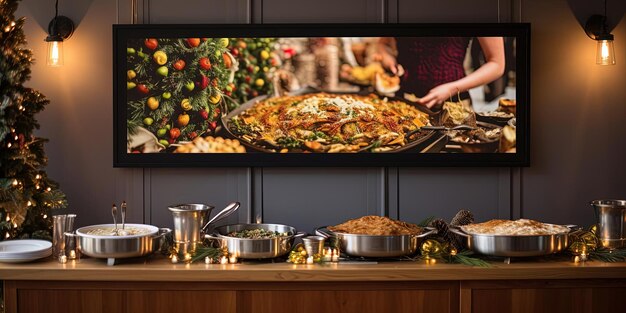The Future of Reality TV: New Dominant Formats in 6 Months

The future of reality TV in the next six months points towards innovative formats centered around interactive participation, hyper-personalized content, and immersive experiences, blending gaming, social media, and real-life challenges to captivate evolving audience preferences.
Reality TV has been a mainstay of our screens for decades, but the landscape is constantly evolving. What new formats will capture our attention in the next six months? The answer lies in innovation, interactivity, and a deeper connection with viewers. Get ready to explore the future of reality TV: What new formats will dominate screens in the next 6 months?
Emerging Trends Shaping Reality TV
The reality TV world is on the cusp of a significant transformation. Several key trends are converging to reshape the formats we’ll be seeing in the next six months. These trends are driven by changing audience expectations, technological advancements, and a desire for more authentic and engaging content.
Let’s delve into the major shifts that will define the future of reality TV, making it more interactive, personalized, and immersive than ever before.
Interactive Storytelling
Viewers want to be more than just passive observers. They crave the ability to influence the narrative and feel like they are part of the story.
Hyper-Personalization
Audiences are increasingly seeking content that resonates with their individual interests and values. The future of reality TV lies in formats that cater to niche demographics and offer personalized viewing experiences.
- Livestreaming Integration: Real-time interaction through platforms like Twitch and YouTube Live.
- Fan Voting and Polling: Direct influence on challenges, eliminations, and overall narrative arcs.
- Augmented Reality Experiences: Immersive elements that blend the virtual and real worlds for viewers at home.
These trends are intertwined, creating a dynamic environment where reality TV formats are constantly evolving to meet the demands of a tech-savvy and engaged audience. As we move forward, the lines between reality and fiction will continue to blur, offering exciting new possibilities for both creators and viewers.
In conclusion, the emerging trends shaping reality TV emphasize greater viewer participation and personalization. Interactive storytelling and hyper-personalization are becoming key elements in new formats, promising a more engaging and tailored viewing experience for audiences.

Gaming and Competition: The Next Level
The intersection of gaming and reality TV is generating some of the most innovative and compelling formats. By incorporating elements of strategy, skill-based challenges, and eSports, these shows are appealing to a wider audience and offering a fresh take on the traditional competition format.
Gaming-inspired reality shows are not just about entertainment; they also tap into the competitive spirit and strategic thinking that are hallmarks of the gaming world.
eSports Integration
Bringing the excitement of professional gaming into the reality TV sphere.
Skill-Based Challenges
Moving beyond traditional physical challenges to incorporate mental agility and strategic prowess.
- Team-Based Tournaments: Contestants competing in virtual arenas, showcasing their gaming skills and teamwork.
- Strategy and Deception: Incorporating elements of survival games like “Among Us” into reality TV formats.
- Virtual Reality Challenges: Immersive experiences that test contestants’ adaptability and problem-solving abilities.
These gaming-inspired formats are attracting a new generation of viewers who are passionate about eSports and competitive gaming. By blending the drama and human connection of reality TV with the strategic depth and excitement of gaming, these shows are poised to become major hits.
To summarize, gaming and competition are pushing reality TV to new heights by integrating eSports elements and skill-based challenges. These formats attract a broader audience, blending the drama of reality TV with the strategic depth of gaming.
Social Media’s Amplified Role
Social media is no longer just a promotional tool for reality TV; it’s becoming an integral part of the viewing experience. Formats are now being designed to incorporate social media interactions, allowing viewers to engage with contestants, influence the narrative, and share their own perspectives.
By leveraging the power of social media, reality TV is creating a more participatory and immersive environment for viewers, blurring the lines between the show and the audience.
Real-Time Feedback
Contestants receive immediate reactions and suggestions from viewers, influencing their decisions and strategies.
Social Media Challenges
Participants are tasked with creating viral content and engaging with audiences on various platforms.
- Live Q&A Sessions: Viewers can directly interact with contestants during the show, asking questions and offering support.
- Influencer Collaborations: Reality TV stars team up with social media influencers to create engaging content and expand their reach.
- User-Generated Content Integration: Show producers incorporate viewer-created videos and comments into the show, fostering a sense of community.
Social media integration is transforming reality TV from a passive viewing experience to an active, participatory one. By giving viewers a voice and allowing them to interact with contestants in real-time, these formats are creating a deeper connection between the show and its audience.
In summary, social media’s amplified role is turning reality TV into a participatory experience. Through real-time feedback and social media challenges, viewers actively engage with contestants, creating a deeper connection.
Niche Content and Hyper-Personalization
As audiences become more fragmented and demand content that caters to their specific interests, reality TV is responding with niche formats that target specific demographics and passions. These hyper-personalized shows are offering a more intimate and relevant viewing experience for viewers.
Niche content is not just about targeting smaller audiences; it’s about creating a deeper connection with those viewers by offering content that speaks directly to their interests and values.
Targeted Demographics
Shows that cater to specific age groups, cultural backgrounds, or lifestyle preferences.
Passionate Communities
Formats that revolve around hobbies, professions, or social causes, uniting people with shared passions.
- Culinary Competitions Focused on Specific Diets: Shows for vegan, gluten-free, or keto enthusiasts.
- Dating Shows for Specific Age Groups: Formats that cater to seniors or millennials.
- Reality Shows About Unique Professions: Series following niche professionals like wildlife photographers or artisan craftsmen.
By catering to niche interests and demographic groups, reality TV is creating a more personalized and relevant viewing experience. These formats are not just about entertainment; they’re about building communities and fostering a sense of belonging among viewers with shared passions.
In conclusion, niche content and hyper-personalization are reshaping reality TV by catering to specific demographics and passions. These formats provide a more intimate and relevant viewing experience, fostering connections among audiences with shared interests.

Ethical Considerations in the Evolving Landscape
As reality TV formats become more interactive and personalized, ethical considerations are taking center stage. The boundaries between entertainment and exploitation are becoming increasingly blurred, raising questions about the well-being of contestants and the impact of these shows on society.
A responsible approach to reality TV requires a commitment to transparency, fairness, and respect for the individuals who participate in these shows.
Mental Health Support
Providing contestants with adequate psychological support before, during, and after the show.
Informed Consent
Ensuring that participants fully understand the potential risks and benefits of participating in reality TV.
- Background Checks and Psychological Evaluations: Screening contestants to identify potential vulnerabilities and provide appropriate support.
- Clear Contractual Agreements: Defining the rights and responsibilities of both the contestants and the production company.
- Post-Show Counseling and Support: Helping contestants adjust to life after reality TV and cope with the challenges of fame and public scrutiny.
By prioritizing the well-being of contestants and adhering to ethical guidelines, reality TV can maintain its integrity and continue to provide engaging and responsible entertainment for audiences worldwide.
In conclusion, ethical considerations are crucial as reality TV evolves. Providing mental health support and ensuring informed consent are vital steps to protect contestants and maintain the integrity of these shows.
The Rise of Hybrid Formats
One of the most exciting trends in the future of reality TV is the emergence of hybrid formats. These shows combine elements of different genres, creating unique and innovative viewing experiences that defy traditional categorizations. By blending reality TV with elements of scripted drama, documentary filmmaking, and social experimentation, these formats are pushing the boundaries of what’s possible.
Hybrid formats are not just about combining different genres; they’re about creating a new kind of storytelling that is more authentic, engaging, and thought-provoking.
Docu-Reality
Shows that follow real people in their everyday lives, but with a heightened sense of drama and narrative structure.
Reality Game Shows with Scripted Elements
Competitions that incorporate fictional scenarios and character development to create a more immersive experience.
- Social Experiments with Ethical Guidelines: Shows that explore human behavior in controlled environments, addressing important social issues.
- Reality TV Blended with Interactive Fiction: Viewers can influence the narrative through voting and making choices for the characters.
- Documentary Series with Reality TV Elements: Shows that explore real-life stories with the dramatic pacing and character-driven narratives of reality TV.
The rise of hybrid formats is a testament to the creative potential of reality TV. By experimenting with different genres and narrative structures, these shows are offering audiences something new and exciting, while also addressing important social issues and pushing the boundaries of storytelling.
To summarize, the rise of hybrid formats is revolutionizing reality TV. By blending genres like documentary and scripted drama, these shows offer unique and thought-provoking experiences.
| Key Point | Brief Description |
|---|---|
| 🎮 Gaming Integration | eSports and skill-based challenges enhance competition. |
| 📱 Social Media Impact | Viewers engage in real-time, influencing narratives. |
| 🎯 Niche Content | Personalized shows cater to specific interests. |
| ⚖️ Ethical Concerns | Importance of mental health support for contestants. |
FAQ
▼
The primary trends include increasing interactivity, hyper-personalization through niche content, integration with social media for real-time feedback, and the blending of gaming elements into competitive formats to attract broader audiences.
▼
Gaming influences reality TV by incorporating eSports competitions, skill-based virtual challenges, and strategic elements familiar to gamers, making shows more engaging and attracting a new demographic interested in competitive gaming.
▼
Ethical considerations ensure that reality TV shows prioritize the mental health and well-being of contestants, and that participants provide informed consent. These considerations are essential for responsible and sustainable entertainment.
▼
Hybrid formats blend elements from different genres such as documentaries, social experiments, and scripted dramas with traditional reality TV. This creates unique storylines and immersive viewing experiences through innovative storytelling techniques.
▼
Social media enhances reality TV by allowing real-time viewer feedback, enabling interactive polls and votes, and expanding audience reach. This creates a more participatory and community-driven experience for viewers and contestants alike.
Conclusion
As we look ahead, the future of reality TV: What new formats will dominate screens in the next 6 months? will be shaped by interactivity, niche content, and ethical practices. The integration of gaming and social media, coupled with a focus on participant well-being, promises a dynamic and responsible viewing experience. The next six months are set to redefine reality TV, offering fresh and engaging entertainment for audiences worldwide.





